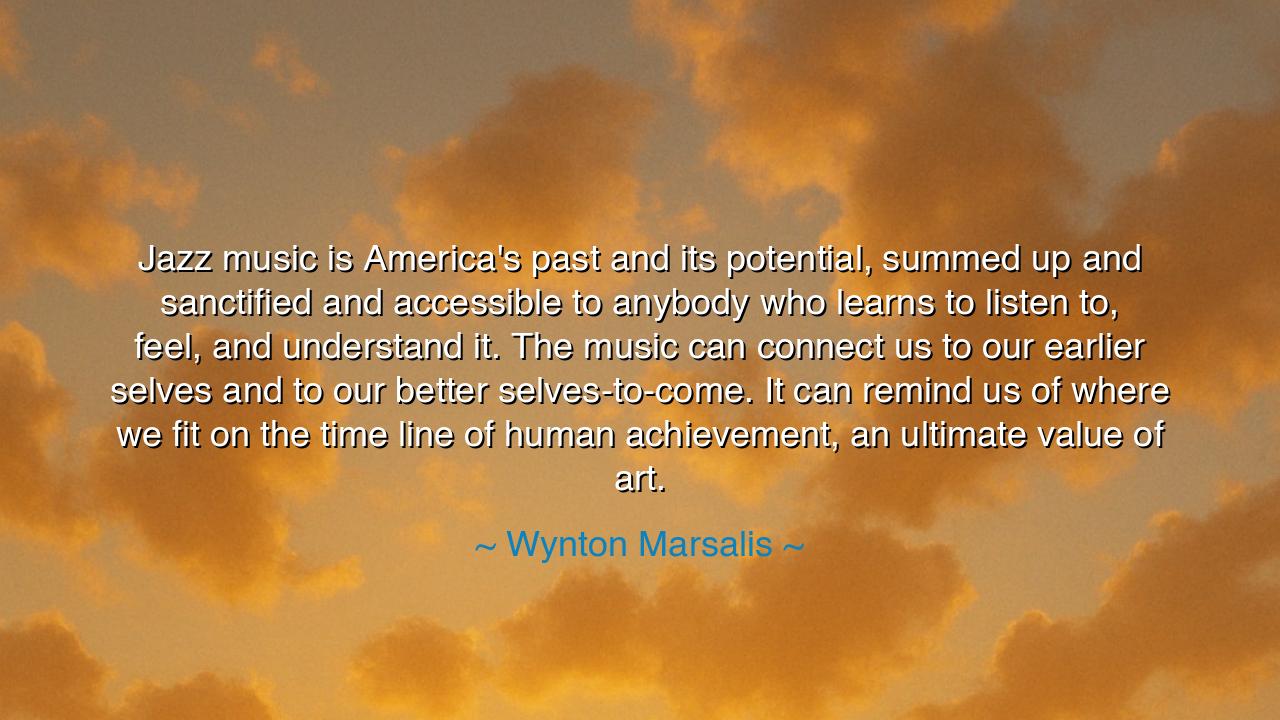
Jazz music is America's past and its potential, summed up and
Jazz music is America's past and its potential, summed up and sanctified and accessible to anybody who learns to listen to, feel, and understand it. The music can connect us to our earlier selves and to our better selves-to-come. It can remind us of where we fit on the time line of human achievement, an ultimate value of art.






The words of Wynton Marsalis resound with reverence and prophecy: “Jazz music is America’s past and its potential, summed up and sanctified and accessible to anybody who learns to listen to, feel, and understand it. The music can connect us to our earlier selves and to our better selves-to-come. It can remind us of where we fit on the timeline of human achievement, an ultimate value of art.” In this vision, jazz is not merely sound or entertainment—it is history, prophecy, and revelation. It carries the memory of struggle and the promise of possibility; it binds generations together in a single song.
The ancients knew the power of music to sanctify the past and to open the future. The Greeks believed that the lyre of Orpheus could bridge the living and the dead, reminding men of their origins and giving them glimpses of eternity. So too does jazz function in Marsalis’s vision: it reaches back to the sorrow songs of slavery, to the ragtime dances of New Orleans, to the cries of trumpets in smoky clubs, and from these roots it grows upward into infinite improvisation, declaring what America might yet become. Jazz is both memory and hope, the map of a people’s survival and their soaring potential.
Consider the story of Louis Armstrong, born in poverty in New Orleans, abandoned by his father, and raised in hardship. Through the trumpet he found his voice, and through jazz he gave that voice to the world. His sound was laughter, defiance, longing, and joy—all woven together in a way that spoke both of America’s past suffering and of its boundless possibility. Armstrong embodied Marsalis’s truth: that jazz, sanctified by pain and exalted by hope, connects us to the best and worst of ourselves and urges us to grow.
Jazz is unique because it demands participation. To hear it rightly, one must not only listen, but feel. Its syncopation calls the body to move, its improvisation calls the spirit to imagine, its harmonies call the heart to remember. It does not speak only to the intellect but to the whole being. This is why Marsalis calls it accessible to anybody—for while it may seem complex, it is, at its core, a dialogue between souls. Those who open themselves to it can find within its rhythms both their roots and their future.
In this way, jazz becomes more than music: it is an ultimate value of art. It reminds us, as Marsalis says, of “where we fit on the timeline of human achievement.” To hear jazz is to place oneself in continuity with those who came before and with those yet to come. It teaches that human achievement is not linear, but improvisational—built on themes, variations, call and response. It shows that greatness is not in perfection, but in the courage to create, to adapt, to voice one’s truth in the moment.
The lesson, O listener, is profound: to understand your place in life, you must listen deeply—not only to music, but to history, to your own soul, to the voices around you. Jazz teaches us that we are part of something larger, a symphony of struggle and triumph. It tells us that art has the power to connect past to future, the broken to the whole, the ordinary to the divine. To learn to listen is to learn to live.
Practical wisdom follows: when you hear jazz, or any music born of deep truth, do not dismiss it as mere sound. Sit with it. Let it stir memory, let it awaken imagination, let it teach you who you are and who you might become. And in your own life, practice the art of jazz: improvise, respond, create in dialogue with the world. Remember your roots, but do not be bound by them—use them as the foundation for new creation.
Thus remember Marsalis’s teaching: jazz is past and potential, memory and prophecy, root and flower. It is America’s story and humanity’s song. To embrace it is to remember who you have been, to glimpse who you may yet become, and to honor the eternal gift of art—that it can carry us from sorrow into triumph, from silence into song, from the past into the future.






AAdministratorAdministrator
Welcome, honored guests. Please leave a comment, we will respond soon